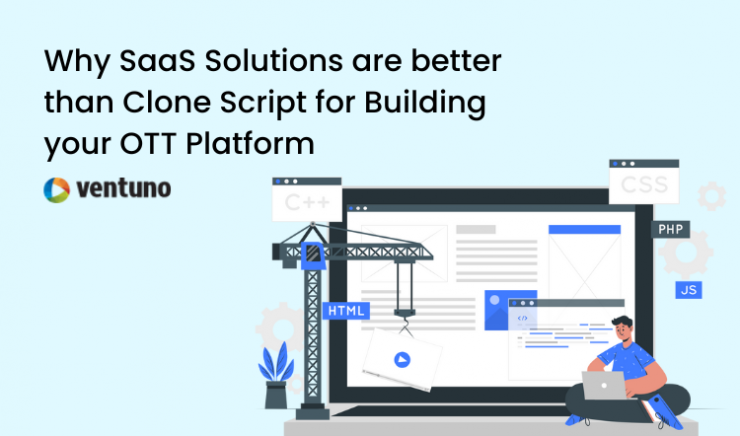Online video streaming has transformed the way people consume video content. OTT platforms built using customized SaaS solutions or a Clone Script of popular websites like Netflix have taken over TV viewership.
Video content is now accessible across multiple screens as it streams over the internet. The availability of streaming services across devices offers viewers a convenient and personalized ‘Over-the-Top’ experience. Research forecasts growth of on-demand video services to around two billion active subscriptions by 2025.
Launching an OTT platform using a SaaS platform or a Clone Script is a great way to engage your audience. You can enjoy increased engagement through seamless video delivery and continued patronage. Building a custom internet-based streaming platform on your own will require investment in advanced technology.
You will need continuous support for scaling and upgrading the platform. Handling it all on your own will leave you with little time for creativity and may cost you a fortune. It is advisable to use technology services to launch your internet stream services. Here is all you need to know to decide which one to use for your OTT platform.
How to build an OTT Platform?
Delivering a great user experience is of utmost importance when building an OTT platform. The technology used to build your streaming platform is a key differentiator among different online TV services. You can choose between SaaS and Clone Script to build an OTT platform for your audience.
SaaS OTT platforms like Ventuno are used to launch, manage, and monetize streaming services. The ready-to-build software allows you to accelerate time to market. You can access the software via secure cloud storage on a subscription basis. SaaS solutions offer the versatility and flexibility required for live tv and on-demand streaming.
Clone Script is an alternate script or code for existing website architecture. You can use a Netflix clone script or YouTube clone script to build yours. It helps you launch your own platform with similar functionality. You may optimize your Clone Script to improve design and functionality to meet customer needs.
SaaS or Clone Script – Which is Better?
Building an OTT streaming service requires integrating a lot of different components:
- Video Player
- Video CMS
- Payment gateway
- Scalable servers
- CDN
- Encoders
- Storage
- Ad Servers
- Analytics tools
While both SaaS and Clone Scripts are great for building an OTT platform, some key features are in favor of SaaS.
1. Development
Developing your OTT platform is the first and most crucial step. SaaS companies offer end-to-end pre-built solutions to speed up the process for you. You get a well-designed frontend with a robust backend and cloud storage. The SaaS platform allows you to easily upload your video content and manage through an intuitive Video CMS from day one of your service activation.
Buying a clone script gives you access to the code of a popular streaming platform but you must develop a backend to actually use it. You must hire developers to build a backend that will allow you to upload, encode, & organize content, set up monetization, build apps, and view analytics.
Editing the code written by another developer is tougher than writing one of your own. It takes more time and cost than you would pay for a SaaS subscription.
2. Maintenance
Ongoing maintenance is essential to manage your OTT platform as it grows. In case of any technical glitches or bugs, you can reach out to your solution provider for assistance. For example, Ventuno offers a fully managed OTT platform setup service backed by an account manager dedicated to your account.
Maintaining a Clone Script is difficult as it is not easy to understand the whole code. Each maintenance request raised to the script provider will be charged additionally at premium rates. To do it on your own, you will need to hire additional resources for website and app maintenance. They will take more time to resolve any issues as the new developers would not be acquainted with the code.
3. Scalability:
Over time, as your website and apps gain popularity, they will drive greater traffic. SaaS solutions offer the flexibility of scaling as per demand. You can expand your server base to cater to peak watch seasons and reduce it as demand goes down.
Clone Scripts do not offer such flexibility and it is not easy to manage fluctuating loads with a stiff code. You will need to expand your team of developers as you scale up, which means an additional cost even as the demand drops.
4. Customization:
The pre-built functionality of SaaS-based services is scalable and robust. You can order custom features for your OTT platform. SaaS OTT solutions like Ventuno are constantly improvised based on your feedback and evolving needs.
Video streaming services built using Clone Scripts may look similar. The platform architecture for all of them remains the same. They may not be robust and any vulnerabilities at the time of cloning will also replicate. Fixing these loopholes will not be easy for someone other than the developer who wrote the script. Though these are customizable, the dependency on developers to achieve customization is more compared to SaaS solutions.
Quick customization is limited to branding and a few UI features. You will need developer assistance to add or remove any functionality as you scale your platform. As for merging non-modular clone scripts is not feasible, developers will need a lot of time for integration. Rewriting the code to customize it is nearly impossible for any developer. Another enhancement bottleneck is integrations are allowed only within the same framework.
5. Cost-efficiency:
SaaS services are available on a subscription-based model, mostly pay-as-you-go. You get the flexibility of opting in and out of features as per your needs. Ongoing software improvement and maintenance upgrades are a part of the service.
Clone Scripts might be cheaper to implement but their maintenance and development costs are comparatively higher. Their coding is complicated and any customization will cost you a lot. Due to the complexity of the code, you will need many developers to work on it which is an additional cost for you. Adding new features means additional costs to hire around 4 to 5 proficient developers. As the process is time taking and ongoing, you end up paying more than estimated. You must also invest in servers before you launch your streaming platform. Clone Scripts may be cheaper to start with but as you scale you end up paying much more than the subscription fee for a fully managed SaaS service.
6. Uniqueness:
SaaS OTT platforms are secure pre-tested frameworks with a flexible UI. You can alter the features to meet specific customer requirements and blend them with your interface. Clone Script is a replica of an already well-performing OTT website or application, which makes it less unique. Your platform will not have any competitive advantage if you don’t work exhaustively on the UI and content. Viewers may not enjoy the experience as it may become repetitive if many platforms are designed using the same clone script.
Takeaway
The popularity of OTT platforms is rising exponentially as more people are switching to internet TV and online streaming services. A SaaS solution is a more cost-effective and hassle-free solution compared to using a Clone Script. Uniqueness, robust performance, and ongoing maintenance make SaaS a better option for launching your OTT streaming platform.
What are your thoughts on this article? reach out to us at info@ventunotech.com if you would like to discuss!
Looking to launch your own streaming service?





